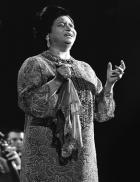Kawkab al-Sharq, Umm Kulthum, is considered one of the most influential artists in the history of Egyptian and Arab art. Rather, she is considered a fourth pyramid that was and is still steadfast and defying all cultural changes throughout the ages.
Umm Kulthum was born in Dakahlia Governorate in the Nile Delta area in Egypt. She was raised in a poor environment for a father who was the imam of the village mosque, and at a young age she began wandering with her father, singing songs at weddings and chanting Qur’anic verses on religious occasions, and her father used to present them as a boy because women were not allowed to read the Qur’an publicly on occasions. At the age of seven, he began to spread her fame until she began wandering the Nile Delta area to sing in various religious and family events and at the age of sixteen her talent was noticed by the famous singer Abu Al-Ela Muhammad and the oud player Zakaria Ahmed, who invited her to Cairo. In 1923, she accepted the invitation and her family moved to Cairo to allow the young star to begin her career. Once she began performing music shows, she was a distinct phenomenon to the rich Cairo crowd, who called her "Bedouin" due to her rural background and traditional musical performance in addition to her clothes that reflected the environment from which she came. After a while, she got to know the poet Ahmed Rami, who wrote 137 songs for her, and the composer Muhammad al-Qasabji. Umm Kulthum, Takht Sharqi, was one of the most skilled musicians of her time, which transferred her from a popular singer to a professional singer and competed with the most important poets and composers of that era to give her their artistic works. She achieved great success by presenting Arabic poetry at her concerts with a beautiful singing performance and an authentic melody that made many audiences, even illiterate ones, memorize this difficult poetry by heart. She got married in 1954 to her doctor and one of her great listeners and fans, and in 1967 she presented for the first time a party outside the Arab world In Paris, the French media said that she had a miraculous voice, with which God loved Egypt, and it would only be repeated every two centuries or a century. Umm Kulthum was the ambassador for Egypt and the Arabs. She sang the anthem "Wallah Zaman Ya Selahi" on October 29, 1956, and now it became a national anthem, when Egypt suffered the defeat of 1967, Umm Kulthum decided to form a National Assembly and held concerts outside Egypt for the benefit of the war effort. Umm Kulthum received many awards and medals. In 1955, she received the Cedar Medal and the Order of Merit of the first class in Lebanon. In 1968 she got the State Award. She also received the Jordanian Order of Al-Nahda, the Iraqi Nishan Al-Rafidain, the Syrian Order of Merit and the Pakistani Star of Merit. She was also awarded the Grand Order of the Republic from Tunisia in 1968 and the Moroccan Medal of Competence. Umm Kulthum was elected an honorary member of the American International Mark Twain Society, and among its members were Eisenhower, Churchill and Roosevelt, which was in 1953, and Egypt granted her a diplomatic passport. Throughout her artistic history since her fondness for religious singing during her childhood and adolescence and her wandering of religious parties and births with her father Sheikh Ibrahim, every stage of her artistic life was a school in itself and a new discovery. She was called by more than one title, such as the planet of the East, the Lady of Arabic Singing, the lyre of the sky, and the people called her Thuma.
